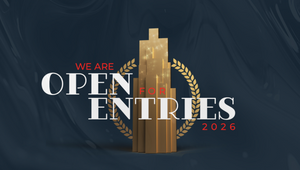
Leo Burnett’s Aki Spicer on How the Measure of Effectiveness in Advertising Got ‘Matrix’d’

AME Awards, the effectiveness focused award show from New York Festivals, has partnered with Little Black Book to sponsor the Awards & Events channel. This channel is a place for general news about award wins and any events being held, but it's also a place to discuss the trends impacting and changing award shows, such a prevalent part of our industry.
As part of this partnership, we'll be interviewing some of the advertising industry's brightest minds and most revered leaders on the meaning of effectiveness in 2021, the advertising awards landscape of the future, and just about anything and everything that might come up along the way. Up today is Aki Spicer, chief strategy officer at Leo Burnett Chicago. LBB's Addison Capper picked his brains.
LBB> What does ‘effectiveness’ in advertising mean to you? What is it made up of?
Aki> Every brand situation will be unique, but at its simplest I look for the change in behaviour in people. Probably that ultimate behaviour change seeks to be a purchase, but coming from a digital background, I have learned to think in terms of verbs and actions on behalf of brands… and I embrace the fact that no single thing will ‘make the sale’, rather a series of unlocks will have to happen for people to eventually get to the commercial act.
I am a firm believer in the value of having the conversation about ‘what is this thing supposed to do?’ upfront with clients, and with the integrated agency ring. Put that simple objective and the path, and KPIs to some simple one-sheet that keeps us true throughout the process – because the act of making advertising has so many twists and turns, you’d be surprised how easy it is to lose track of ‘what was this thing supposed to even do?’
LBB> How do you feel the measure of effectiveness has changed over the years?
Aki> Measures of effectiveness have changed particularly as new media constantly emerge, it certainly got more ‘matrix’d’, it seems (so many channels and media and contexts – and by default a ‘measure’ evolves).
Clients have tended to see effectiveness as a very myopic ‘did it lift sales?’, and that is fair because at the end of the day, sales lift is likely what we are all in the business to achieve. But the problem is people. People are not so compliant as marketers would like – they are living their lives. Duh. They are distracted by the pursuit of living and are generally uncaring about our new (or not really new) ‘thing’ and so now you’ve got to work harder to give people value for their considerations and it's all just so complicated by complicated people! So our customer journeys got more complex, and that forces more rigour, more assets, more math. All this complexity further demands a simple headline of what it is we all agree to do that will unlock those critical commercial actions.
LBB> In recent years it seems like effectiveness awards have grown in prestige and agencies have paid more attention to them. How do you think this has impacted on how strategists work and the way they are perceived?
Aki> I observe clients prioritising effectiveness - that impacts how agencies prioritise. Again in this time of ‘too much’ (so many platforms vying for people’s attention, so much content attacking the cortex, and not enough resources to be everywhere) we have to make choices so everyone is keen to understand effectiveness. I think that brands and agencies alike have wanted to demonstrate that awards are about more than vanity but rather showcasing the role that creativity plays in fuelling positive outcomes.
LBB> We’re used to hearing about the best creative advertising campaigns, but what’s your favourite historic campaign from a strategic perspective? One that you feel demonstrates great strategy - and perhaps effectiveness?
Aki> I have always loved the mythic ‘Diamond Shreddies’ Case for its simplicity and elegance… hopefully it is real and not a comedy satire or a ‘Kaiser Sose’ urban myth. The problem to solve was raising relevance and thus sales for square wheat Shreddies cereal. I understood that the strategic pivot was to simply turn the product on its corner on the box, call the squares more aspirational ‘diamonds’, and voila ‘introducing new Diamond Shreddies!’ Salience and sales lift ensue, and scene. If the case was never real, I still like it as a metaphor for what we fundamentally do – create irresistible value in the mind, for people.
LBB> What are your views on this past year of advertising through Covid? Do you feel that it has taught us anything / will have a lasting impact on the industry?
Aki> I feel 2020 has reinforced our ability to pivot and be responsive to the moment. Much of what we do is translate culture and the times, and 2020 really pushed us all to deliver at the speed of culture.
LBB> The awards landscape has changed dramatically over the past year, with some shows moving online, cancelling ceremonies, etc. What are your thoughts on the future of advertising awards?
Aki> I hope to see a return to adding IRL connections at conferences and ceremonies. Certainly we have learned some efficiencies and benefit from virtual events, but IRL conferences can provide that spark of serendipity – random encounters with others and even the undistracted focus that virtual cannot deliver, yet.













